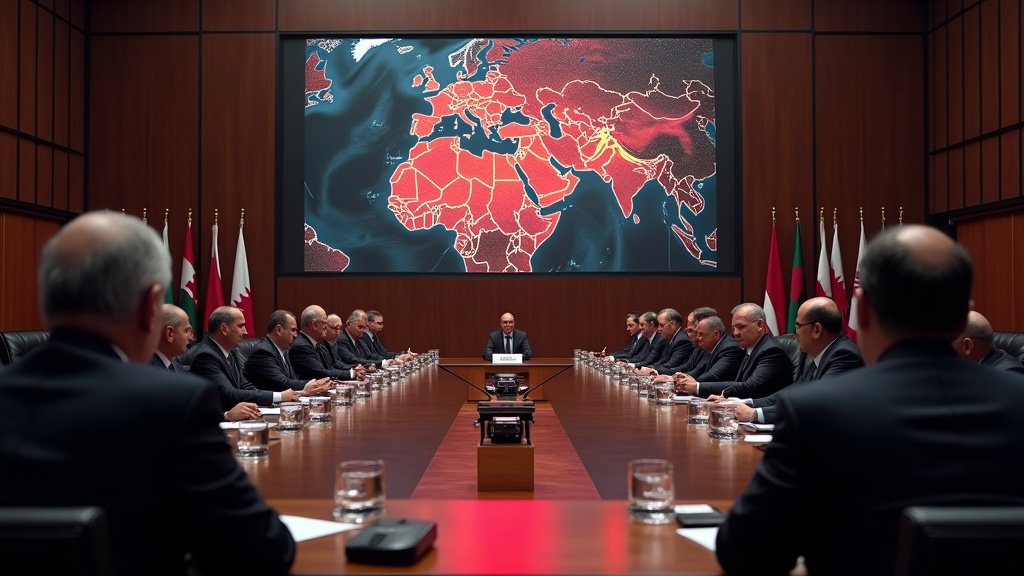The world stage on September 15, 2025, is grappling with two major geopolitical flashpoints: escalating tensions between Israel and Qatar following a targeted Israeli airstrike in Doha, and a significant political upheaval in Nepal triggered by widespread protests and the resignation of its prime minister.
Israel-Qatar Tensions Escalate Over Doha Strike
International condemnation has sharply followed an unprecedented Israeli airstrike on September 9, 2025, in Doha, Qatar, which targeted senior Hamas officials amidst ongoing Gaza ceasefire negotiations. The strike resulted in the deaths of five Hamas members and a Qatari security officer, though key Hamas leadership reportedly survived. Qatar vehemently denounced the attack as a “blatant violation of its sovereignty and international law.” The international community, including the UN Secretary-General, China, Russia, and numerous Arab and Islamic states, has widely condemned the action, with many viewing it as an attempt to sabotage the fragile peace talks. An emergency Arab-Islamic summit convened in Doha to address the repercussions and formulate a unified response.
In the United States, President Donald Trump urged Israel to be “very, very careful” in its actions, acknowledging Qatar as a “great ally” to the US. While reiterating support for Israel, the US administration expressed dismay over the unilateral escalation. The strike has significantly complicated regional diplomacy, strained alliances, and threatened to undermine Qatar’s crucial role as a mediator in the Israeli-Palestinian conflict.
Nepal Plunged into Political Crisis Amidst Nationwide Protests
Nepal is experiencing significant political turmoil following two days of widespread protests that erupted on September 8 and 9, 2025. The unrest was initially sparked by a government ban on numerous social media platforms, but quickly evolved into a nationwide uprising fueled by deep-seated public frustration over institutional corruption, nepotism, and alleged mismanagement of public funds by political elites. Reports indicate that protests escalated into violent riots, with demonstrators torching government buildings, including the Parliament and the Prime Minister’s Office.
In the wake of the deadly clashes, which reportedly left 19 dead and hundreds injured, Prime Minister K. P. Sharma Oli resigned on September 9, 2025. The social media ban has since been lifted, and Sushila Karki has been appointed as the interim Prime Minister. The country’s Parliament has been dissolved, with elections slated for 2026.
Broader Global and Domestic News Landscape
Beyond these headline events, the world news cycle on September 15, 2025, is marked by several other significant developments. In the ongoing Ukraine war, Ukrainian drones reportedly struck a major Russian oil refinery in Leningrad Oblast and a chemical plant in Perm Krai on September 14, further disrupting Russian logistics and energy infrastructure. Romania and Poland have reported increased vigilance due to Russian drone activity near their borders.
Discussions surrounding sanctions against Russia continue, with President Trump stating he is prepared to impose “major sanctions” contingent on all NATO allies halting oil purchases from Russia and enacting similar measures. US House Speaker Mike Johnson indicated that Congress would not move forward with new sanctions without President Trump’s approval.
Meanwhile, US and China trade talks resumed in Madrid, focusing on contentious issues such as tariffs, technology transfers, and the fate of the TikTok app, with expectations of a deadline extension for its divestiture.
Domestically, the United States is facing growing concerns over long-term unemployment, which rose to 1.13% in August 2025, affecting nearly 1.9 million Americans. The overall unemployment rate also saw a slight increase to 4.3%. In a separate domestic incident, the investigation into the assassination of conservative activist Charlie Kirk on September 10, 2025, at Utah Valley University is progressing, with the FBI reportedly looking into potential ties between the suspect and leftist groups.
Conclusion
September 15, 2025, presents a complex and volatile global news environment, characterized by heightened international tensions between key regional players, significant domestic unrest in Nepal leading to governmental change, and persistent geopolitical conflicts and economic concerns worldwide. The interconnectedness of these events underscores the intricate challenges facing international diplomacy and national stability in the current era.

